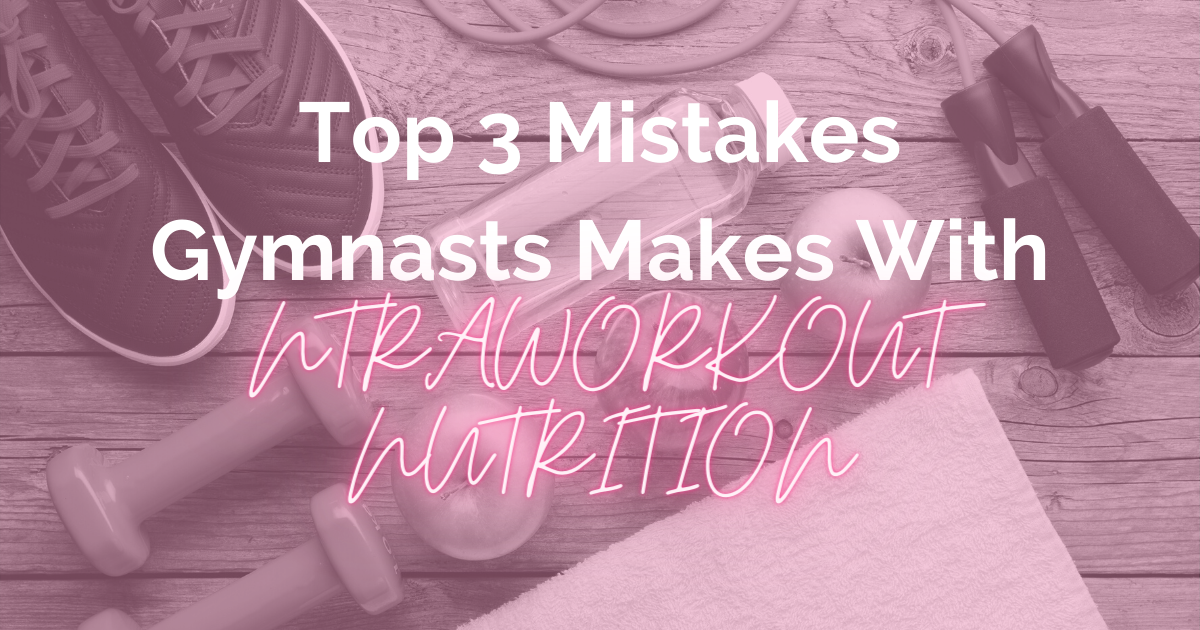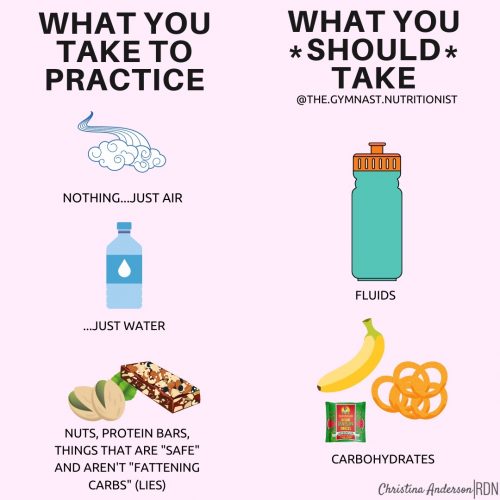
Top 3 mistakes gymnasts make with intraworkout nutrition
explore the blog
free training
The Podcast
Learn to fuel the gymnast for optimal performance and longevity in the sport.
How to Fuel the Gymnast
Learn how to fuel your gymnast so that you can avoid the top 3 major nutrition mistakes that keep most gymnasts stuck, struggling, and injured.
looking for...?

What is “intraworkout nutrition”? This is the food that athletes use during workouts to boost performance. This food is not just nutritive in the sense of abating “hunger”, but is specifically used to “fuel for the work required”.
Most sports like soccer, football, basketball, endurance running and cycling get this part of sports nutrition “right”. It’s rare to see one of these athletes during 2+ hour workouts to not have some source of intraworkout nutrition.
Gymnastics on the other hand has historically been a sport focused on “skinny, light, lean” and thus avoids what is deemed “extra calories”, when in fact intraworkout nutrition is not extra at all.
As a gymnast, I didn’t get this right. I didn’t want the “extra calories” as I was worried and also very concerned that the thing I was being asked to fuel with (carbs) we’re going to “make me fat”. All of these notions stem from #dietculture and misinformation. The consequence of the myths and lies is underfueled high level gymnasts that are not reaching their full potential in the gym.
In today’s gymnastics culture, there are a few common scenarios I see in terms of handling intraworkout nutrition.
- Most high level gymnasts have a snack-break mid-way through practice, usually at the 2-2.5 hour mark (which may or may not be too late to start intraworkout fueling, all depends on the athlete, intensity/frequency/duration of the workout, etc).
- If the gym doesn’t provide a snack break, they are still open to athletes bringing in and consuming whatever food and fluids they deem necessary, though this leaves more gymnasts underfueled since they may feel chastised for going to their locker during a rotation when no one else is to get a drink or snack.
- The gym does not allow solid food during practice, and this may be by choice or due to COVID health and safety regulations. If related to COVID, the issue is that often liquid carbohydrate sources (that would be appropriate to keep in a bottle if that’s all that’s allowed) are juice or sports drinks and to a lot of people in the gymnastics world these things are “toxic”, thank you #dietculture.
Some gymnasts bring nothing but water to practice
For lower level gymnasts that have workouts less than 2 hours, this is fine as long as there is a good pre-workout snack. For young compulsory gymnasts, their pre-workout snack will likely coincide with an already planned and needed afternoon snack.
For high level gymnasts with more intense workouts of 3+ hours or longer in duration, a pre-workout snack alone is likely insufficient for proper fueling and appropriate energy throughout practice.
I like to start intraworkout nutrition about 1.5 hr into a workout, though this depends on what the gymnast has eaten that day, if the workout is early morning or afternoon, their injury/health status, etc.
Some gymnasts bring just protein or fat as an intraworkout snack
Why would a gymnast bring foods like nuts, hardboiled eggs, protein shakes, protein bars, etc to a workout when it’s pretty well-known that carbohydrates are the athlete’s fuel.
Because….#dietculture.
Fat and protein both can be turned into usable substrates (fuel source) for the muscles and brain, but takes a while (4-6 hours for protein, fat depends on what energy source is available, but a very slow fuel). Fat, protein, and fiber all delay gastric (stomach) emptying which is going to delay how quickly the fuel can get into the intestines, into the bloodstream, and then to the brain, muscles, and organs it needs to support. During exercise, stomach blood flow is already reduced, especially for high-intensity exercise, so this is not the time for anything aside from mostly carbohydrate.
Now, an athlete could incorporate small amounts of protein intraworkout as way to support recovery, but this isn’t necessary if a gymnast has had adequate protein throughout the day. Let’s say the athlete is short on protein, they could incorporate 5-15 g of essential amino acids (whey protein, easily digested) along with the carbohydrate.
Most gymnasts do not eat enough during 4+ hour practices
If gyms do give a break, it’s at the half-way point. For a 12-13 year old gymnast with a 5 hr workout, a break 2.5 hr into practice is a bit late if we consider timing of digestion.
Intraworkout nutrition isn’t intended for abating “hunger”. If a gymnast is starving during their workout, it’s quite likely they need to eat more throughout day and went into the practice underfueled.
The intra-workout snack should be primarily easy-to-digest carbohydrate with minimal fat, protein, fiber. We want to keep this fuel source mostly carbs due to digestion, timing, and the high intensity nature of gymnastics
In terms of “how much” and “when” carbohydrate is needed, this is dependent on the gymnast’s age, weight, intensity/duration of the workout, and previous nutrition leading up to the workout.
On average, sport requires 30-60g carbohydrate per hour but with a sport like gymnastics you have to think about the actual time spent “working” during a 4+ hour practice. Four hours of gymnastics is not the same as 4 hours of running or cycling, though depending on the intensity gymnastics could easily use 30-45g+ carbohydrate within an hour. It’s all about nuance when estimating intraworkout carbohydrate utilization. Some “hours” of practice may only require 10-15 g carbohydrate while others (more intense events, difficult/high workload assignments) may need 30g+.
Does protein intraworkout boost performance?
In terms of enhancing performance, current research does not support an added performance benefit from adding protein to carbohydrate intraworkout versus solely using adequate carbohydrate.
There is research that demonstrates the provision of protein and carbohydrate during endurance-type exercise improves whole-body protein status (preventing excessive breakdown), but this is for 5 hours of continuous exercise like cycling. Whole-body protein synthesis is not the same as muscle protein synthesis which would be more of the focus with a sport like gymnastics that requires a high level of strength and power.
Should a gymnast consume protein intraworkout?
Some researchers and professionals will suggest protein intraworkout to help extended the window of muscle protein synthesis from a recovery stand-point. This is more important when an athlete has not had adequate protein and nutrition throughout the day.
If an athlete has had adequate protein throughout the day, then intra-workout protein is likely unnecessary unless it’s a 5-6+ hour workout and the athlete is starting to need some more nutrition than just carbohydrate.
If you do use protein intraworkout, about 5-15 g of essential amino acids (must get through food as body cannot make) as may support further repair and recovery. Animal protein (meat, seafood, poultry, eggs, dairy) will have all 9 of the essential amino acids. Plant-based protein like soy, quinoa, and buckwheat also contain all 9 essential amino acids but they are not as available to the body (except for soy, it’s similar to cow’s milk).
For a 2-3 hour high intensity workout I’d say that carbohydrate alone is likely adequate. If the workout is 4+ hours and spans a few meals/snacks, then it may be beneficial to add in a little high quality protein, but you need to get the timing right as protein delays gastric emptying and will slow down the carbohydrate availability.
In Summary
Carbohydrate utilization during high level practices is a legal, cheap, and effective strategy to improve performance. Some athletes may need very small amounts of protein to support muscle protein synthesis and recovery, especially when pre-workout nutrition has been inadequate.
If you have questions or concerns about your athlete, feel free to drop me a line. If you’re interested in 1:1 nutrition coaching, you can apply here.
on the blog